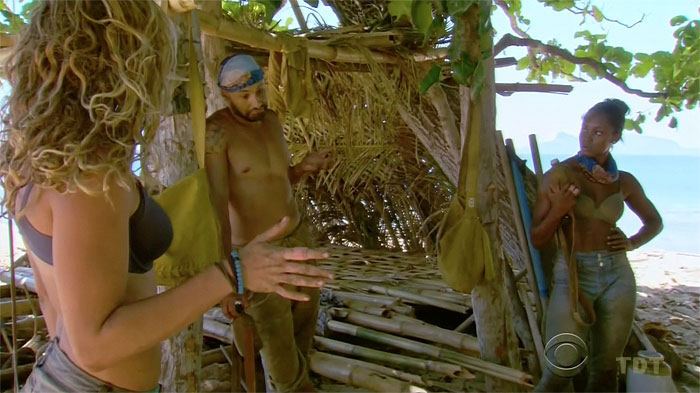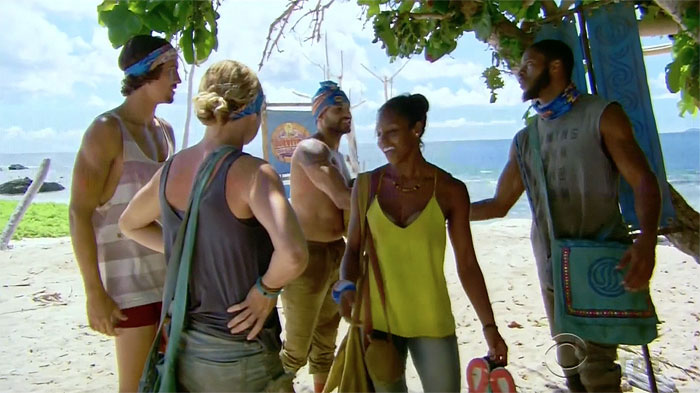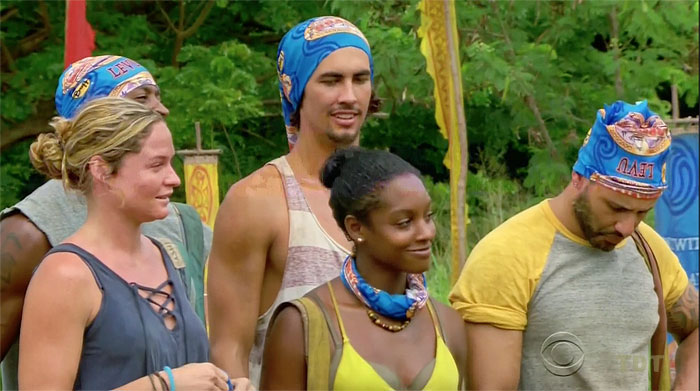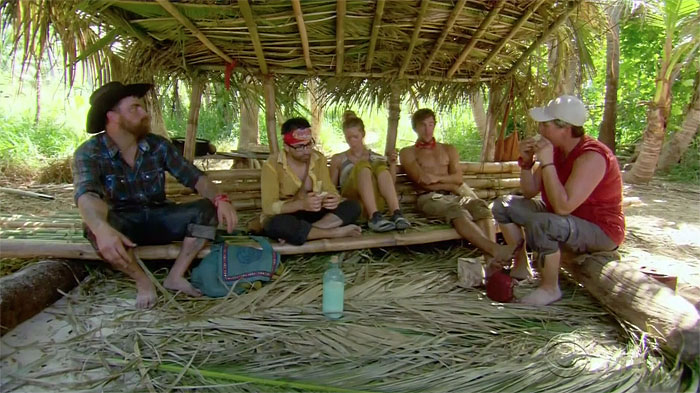

Before we get to the theory this week, can we talk about Jessica’s move? I’m not really sure how I feel about the introduction of another advantage, but I am sure I don’t like Jessica’s move.
Why, oh why, would she give the “advantage” to Devon? It made no sense. Clearly, that tribe looked like it would be two Heroes vs. two Healers. Jessica said she wanted to help the Healers. Why, oh why, take the vote away from the swing vote, then?
You’ll see below that, in general, I like how Jessica’s playing this game, but this move makes me a bit nervous. Why do this? Why keep telling Cole things? Why yell so much at people during challenges? These are my questions, but, in general, I can’t figure out that Devon move. I hope that when Jessica leaves the game, someone doing exit interviews asks the question.
The tribe swap made me want to look into group dynamics this week. There are all kinds of theories out there that attempt to explain organizational communication or, essentially, how groups work most effectively. And I’ve done that in the past in this blog, but, this time, I wanted to delve into group cohesion theory, which scholars have utilized in studies of professional organizations, but also to examine, for example, what makes sports teams successful.
The theory of group cohesion explains the forces that hold groups together. In successful organizations, both small and large, membership can remain strong only through a cohesion between members. This does not mean that each of the members believes the same things and performs their roles in a similar manner, but the members must all align with the main mission of the organization. In Survivor, that’s winning challenges.
Sports psychology scholar Alfred Carron identified four parts of the theory: leadership, personal, situational and organization factors. Essentially, cohesion develops within membership of an organization when members feel close to and respect leadership (or each other), believe they are a fundamental part of the organization, perceive a strong cohesion within the group and have perceived organizational success.
So what does this all mean for Survivor? Well, I think all tribes should want to be as successful as possible and, to do that, you need castaways who are focused on that success. Of course, everyone will have differing personal goals, but those must be put secondary to tribal goals (until, for example, before tribal council).

In general, I think you saw that a bit last episode. Immediately, the new tribe of Alan, Ashley, Devon, Desi and Joe started thinking about factions. Joe started to lie to Devon before he had to … and this backfired. Everyone on that tribe, at least according to the episode, was far more focused on the next boot instead of the next challenge. That’s a problem.
I think, if you look at the history of the show, the tribes, regardless of if they get along, that do the best always seem most focused on staying together … until they can’t do that anymore. There is a cohesion, a belief in the power of the tribe. And, I believe, that’s how you can see what tribes are going to the best: Look for what tribes, regardless of alliances, are laser focused on winning challenges and deal with booting people only when they have to make that decision.
With the tribe swap, I feel like there’s a lot to talk about as many castaways have seen their fortunes change. Let’s talk about each of them:
Levu

- 1. Ashley – I’m going to give Ashley some credit here, something I’ve been reluctant to do most weeks. I would have guessed the minute she entered the swap with Alan, she was turning on him. It would have been a bad move, and Ashley made the right one. And she also did a great job bonding with Devon.
- 2. Devon – For a few episodes there, editors made it seem like Devon was kind of Ryan’s puppy dog, just someone who went along with everything someone else said. I think we’ve learned, over the last couple weeks, Devon isn’t bad at this game. I know Joe is about as obvious as a sledgehammer, but Devon saw through that immediately.
- 3. Joe – So a couple things on Joe. First, he got very excited about using an idol that he literally wasted. Second, the dude is just way too obvious about everything. He wants to be Tony, but Tony was amazing at reading people. So far, Joe sucks at it.
- 4. Desi – Desi talks! Oh my god, it’s a miracle. It’s kind of sad she only spoke after Joe screwed her over, though. Here’s hoping this tribe loses again next week and it’s a 3-1 vote against Joe. Nothing against Joe since he’s an entertaining character, but I feel like he’s made enough mistakes that he just deserves to go home right now.
Yawa

- 1. Ben – Once again, despite facing a problem, Ben seems to come out ahead. I don’t know if he can win because eventually everyone will see him as the threat he is, but, right now, he’s killing it.
- 2. Jessica – Fool me once, shame on you. Fool me twice, shame on me. Jessica, Jessica, Jessica … don’t tell Cole a damn thing. And also, don’t get so visibly upset during challenges; when you finally lose, that’s not going to go over well. But, hey, this is what a good early game looks like, right?
- 3. Cole – I said last week that Cole might not be a good player. I am so doubling down on that. I can’t even process what would be going through his mind when he decides to tell literally the entire tribe about the advantage. In the end, it wasn’t an advantage that could really matter in terms of the tribe maneuvering, but what’s the end game? Maybe only telling Ben would have made sense, although I don’t think so, but Lauren too? I don’t get you, Cole.
- 4. Lauren – I’m not sure what Lauren thought she could do with the information about the advantage, but, OK? Also, we didn’t get to see Lauren really making any new connections on her new tribe. She may have and editors didn’t show them to us, but, if not, she better get moving. She looks first to go on this tribe.
- 5. Mike – I think Mike is in the best position on this tribe. He’s with Cole and Jessica, in their minds and that’s a majority. But if Lauren or Ben want to shake the game up, it’s all about what Dr. Mike wants to do. I thought last week the tribe swap would be most beneficial to Mike out of anyone, and it sure looks like I was right … for once.
Soko

- 1. Roark – Poor Roark. She’s back to not speaking. I loved Roark during the pregame, but I fear she’s going to be that castaway who least deserves being there when we get our first glance at the final six. Don’t you think?
- 2. JP – I mean, look at this, we’re heading into the fifth episode of the season and I don’t see any way JP goes home next week. That means my Winner Pick™ will make it past Halloween. Wow. Maybe the curse that I put on picks isn’t working anymore?
- 3. Chrissy – The bonding moment between Chrissy and Ryan played well on television. I do, however, think it showed how one of them is the better player. Chrissy talked about how Ryan probably thought of her as a mom. Of course, Ryan really gave her the idol so he could keep a weaker player in the game.
- 4. Ali – Once again, Ali’s looking good. I wish I had her on my fantasy team. If I had to guess right now who was receiving the Winner’s Edit™, I’d be on Ali. And maybe Chrissy. That’s a good thing because both are playing great games.
- 5. Ryan – I was far more pessimistic about Ryan than most of my fellow True Dork Times bloggers and, let me say, I’m the wrong one. He’s playing a hell of a game so far. I don’t think he wins, but he’s making the merge.
Well, that’s it. Let’s talk again next week. I’m excited about the next episode. This episode, truthfully, is the one that hooked me on the season. I’m all in.
 Pat Ferrucci started watching Survivor when Episode Two of Borneo first aired. He's seen every episode since. Besides recapping here, he'll be live-tweeting this season from the Mountain Time Zone. Why? Because nobody cares about the Mountain Time Zone except when they want to ski. Follow him @patferrucci for Survivor stuff and tweets about anything and everything that enters his feeble mind.
Pat Ferrucci started watching Survivor when Episode Two of Borneo first aired. He's seen every episode since. Besides recapping here, he'll be live-tweeting this season from the Mountain Time Zone. Why? Because nobody cares about the Mountain Time Zone except when they want to ski. Follow him @patferrucci for Survivor stuff and tweets about anything and everything that enters his feeble mind.
- S35 Well, in theory... index
- Pre-season: TDT Survivor: HHH contestant draft
- Cast: Who am I going to curse this season?
- Ep.1: Let's talk some in-group and some out-group
- Ep.2: You're a hustler. A hustler. You are. Yes you.
- Ep.3: His name was Patrick. Now it's Matthew
- Ep.4: It's all about cohesion, the cohesion of the group
- Ep.5: The ego and its utility, a tale of contradictory ethics
- Ep.6: Who holds the power at the merge?
- Ep.7: Who holds the golden fleece after the merge?
- Ep.9: Ben needs a lesson in mass communication theory... badly
- Eps.10-11: Chrissy and Ryan get lost in their own story
- Ep.12: Let's have a chat about hypocrisy
- Ep.13: Where does it all stand?
- Pre-Ep.14: Jury jeopardy - HvHvH